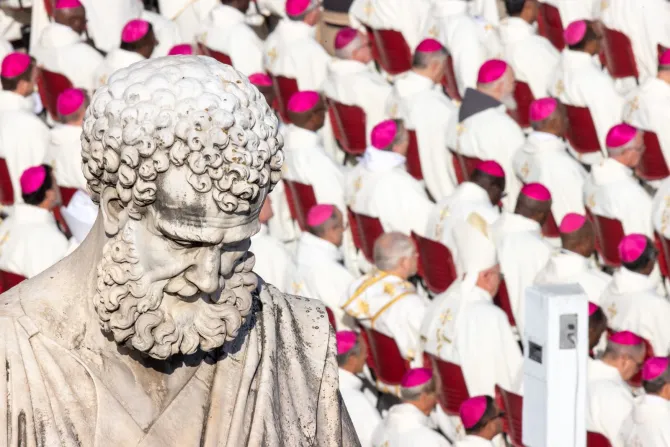The long-anticipated Synod on Synodality is upon us. After years of preparation and planning, after tireless efforts to build enthusiasm and encourage participation, the Vatican is trying to temper expectations.
A few days ago, the new prefect of the Dicastery for the Doctrine of the Faith tried to downplay expectations for this October’s meeting. Cardinal Víctor Manuel Fernández insisted, “People who are afraid of strange or misplaced doctrinal advances, and people who, on the other hand, expect great changes, are going to be really disappointed.”
In yesterday’s homily at the opening Mass for the Synod on Synodality, Pope Francis called for a Church which, “amid the sometimes-agitated waves of our time, does not lose heart, does not seek ideological loopholes, does not barricade itself behind preconceived notions, does not give in to convenient solutions, does not let the world dictate its agenda.”
The Holy Father also felt compelled to reiterate a point he has been making with increasing frequency: “Here [at the synod] we do not need a purely natural vision, made up of human strategies, political calculations or ideological battles. We are not here to carry out a parliamentary meeting or a plan of reformation. No.”
Expectations for the synod – expectations both hopeful and fearful – have grown so great that it is increasingly difficult to imagine an outcome for the synod that doesn’t leave large parts of the Church feeling hoodwinked.
Those who (like the pope’s Relator General of the Synod, Cardinal Jean-Claude Hollerich, S.J.) believe the Church’s teaching on human sexuality is “false,” see the synod as their best hope for changing that teaching. Likewise for those pushing for the ordination of female deacons and even female priests. When the synod organizers use promotional materials featuring images of a woman in a stole and chasuble, it makes it harder to believe the synod organizers when they insist they are totally on the level.
Pope Francis, for his part, has not thrown his formal support behind any of these proposed changes to moral teaching or sacramental discipline. But he has shown an unwillingness, or at least a reluctance, to give definitive negative answers either. One need look no further than his treatment of the German Synodal Way or of the Belgian bishops’ conference to find instances where Pope Francis has said “no” in principle to what he has permitted in practice.
All of this has been rehearsed elsewhere. The point I want to make is this: the expectation for radical change is not a fiction created by the media, though both secular and Catholic media outlets have certainly helped reinforce those expectations. Nor were these expectations the creation of papal critics, Trads, or “backwardist” Americans.
More than anything else, these expectations have been fed and nourished by the Vatican itself, not least through a synod communications and marketing strategy that promises novelty and presupposes change.

For more than two years, prelates around the world have striven to outdo one another in their lavishing praise on the synod and on synodality. Whether done in earnest, or in order to be seen as a supporter of the Holy Father, or at least to avoid being flagged as a papal critic, all that superfluous, superlative verbiage begins to add up. Not all the praise has been sycophantic, but there has been a very definite current of praise and expectation, which has pulled many along with it.
How many enthusiastic Catholics – clergy or laity – have taken to social media, or Catholic websites, or stood up at conferences and declared, in so many words, that the synod has been a triumph of authentic discernment before it has even taken place?
It’s not that the synod cannot produce a genuine discernment of the will of the Holy Spirit (it can, and I sincerely pray that it does). It’s that presumption makes such discernment less likely and the advancement of some preconceived outcome (whether good or bad) more likely.
As it is, the synod now commences under a powerful presumption of change. The whole Church, the whole world, is expecting Something Big. And you can be sure that the synod participants will feel tremendous pressure to deliver. . .well. . .something, lest all these efforts be in vain, and all the fine words prove false.
It remains to be seen whether the Vatican’s recent efforts to deflate expectations for the synod will work, now that the “narrative of radical change” surrounding the synod has been so deeply established. Many in the Church feel they’ve been promised a revolution; many feel they’ve been promised precisely the opposite.
Pope Francis concluded his homily yesterday by precisely addressing those expectations. And pointing to a way, a narrow but possible way, to overcome the difficulties of seemingly inevitable disappointment:
And if God’s holy people with their shepherds from all over the world have expectations, hopes and even some fears about the Synod we are beginning, let us continue to remember that it is not a political gathering, but a convocation in the Spirit; not a polarized parliament, but a place of grace and communion. The Holy Spirit often shatters our expectations to create something new that surpasses our predictions and negativity. Let us open ourselves to him and call upon him, the protagonist, the Holy Spirit. And let us walk with him, in trust and with joy.
For the sake of the synod, and for the sake of the entire Church, I hope all of the participants, the Holy Father included, really are willing to let their expectations be shattered by the Holy Spirit. Otherwise, it seems inevitable that someone is going to come out of this Synod, not just disappointed, but feeling as though they’ve been sold a bill of goods.
__________















